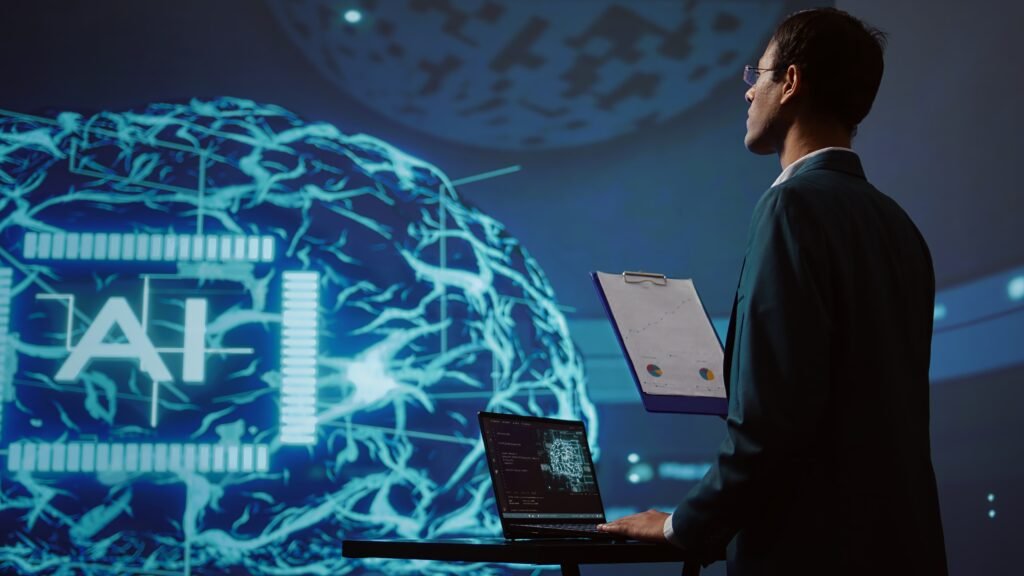Artificial intelligence is no longer a futuristic idea — it is already shaping how we work, hire, communicate, and grow in our careers. From smart automation tools to AI-powered decision-making, the modern workplace is evolving faster than ever. Understanding AI and the future of work is essential for professionals, businesses, and students who want to stay relevant in this rapidly changing world.
Rather than replacing humans completely, AI is transforming job roles, improving productivity, and creating entirely new career opportunities. The key is learning how to work with AI, not against it.

Artificial Intelligence in the Workplace: A New Era of Productivity
The integration of artificial intelligence in the workplace has changed how daily tasks are performed. Repetitive and time-consuming processes are now handled by intelligent systems, allowing employees to focus on creative, strategic, and people-driven work.
Automation of Routine Tasks
One of the biggest impacts of AI automation and the future of work is the reduction of manual tasks. AI can now:
-
Analyze large amounts of data in seconds
-
Schedule meetings and manage calendars
-
Automate customer support through chatbots
-
Process invoices and financial reports
This doesn’t eliminate jobs — it changes how work is done. Employees are shifting from task-based roles to value-based roles.
Smarter Decision-Making
AI tools help organizations make better decisions by:
-
Predicting market trends
-
Analyzing customer behavior
-
Identifying risks
-
Optimizing operations
This allows companies to move faster and stay competitive in a data-driven economy.
Improved Work Efficiency
AI-powered platforms reduce human error and increase speed. Teams can collaborate more effectively using smart tools that:
-
Suggest content ideas
-
Automate marketing campaigns
-
Track performance metrics
-
Personalize user experiences
As a result, businesses achieve higher productivity with fewer resources.

Future Jobs With AI: New Opportunities and Skills
The rise of AI is not just about automation — it is also about job creation. Many jobs with AI didn’t exist a decade ago.
Emerging Career Paths
Some of the fastest-growing future jobs with AI include:
-
AI specialists and machine learning engineers
-
Data analysts and data scientists
-
AI ethics consultants
-
Automation workflow designers
-
Digital transformation managers
In addition, traditional roles are becoming AI-assisted. For example:
-
Marketers use AI for customer insights
-
Doctors use AI for diagnostics
-
Teachers use AI for personalized learning
This shows that AI is a tool that enhances human capabilities.

The Skills That Will Matter Most
To succeed in the future workplace, technical skills alone are not enough. The most valuable skills will be:
-
Critical thinking
-
Creativity
-
Emotional intelligence
-
Adaptability
-
Digital literacy
These are areas where humans will always have an advantage.
Remote Work and AI Collaboration
AI is also supporting the global shift toward remote and hybrid work. Smart collaboration tools can:
-
Transcribe meetings
-
Translate languages in real time
-
Track project progress
-
Provide performance insights
This makes teamwork easier across different locations and time zones.

Challenges and How to Prepare for Them
While the benefits are significant, AI also brings challenges. Some roles will change or disappear, and workers will need to reskill.
The best way to prepare is to:
-
Learn new digital tools
-
Stay updated with industry trends
-
Focus on continuous learning
-
Develop human-centered skills
Organizations also need to invest in training programs to help employees transition into new roles.
How Businesses Can Adapt to AI
Companies that embrace AI early will have a strong competitive advantage. They can start by:
-
Implementing AI-powered tools in daily operations
-
Training employees in digital skills
-
Using data for smarter decision-making
-
Automating repetitive workflows
This approach ensures long-term sustainability and growth.
Final Thoughts
The transformation brought by AI and the future of work is not something to fear — it is something to understand and prepare for. AI is changing job roles, creating new opportunities, and redefining what productivity looks like.
The professionals who will succeed are those who:
-
Embrace technology
-
Continue learning
-
Develop uniquely human skills
As AI automation and the future of work continue to evolve, one thing is clear — the workplace will become more intelligent, more flexible, and more innovative than ever before.
1. Will AI replace human jobs completely?
AI will automate many routine and repetitive tasks, but it is unlikely to replace humans entirely. Instead, AI will change job roles, making humans focus more on creativity, strategy, decision-making, and emotional intelligence — skills machines cannot fully replicate.
2. What skills will be most valuable in an AI-driven world?
Skills like critical thinking, problem-solving, creativity, communication, and emotional intelligence will become more important. Technical abilities such as data literacy, AI understanding, and digital skills will also play a big role in future careers.
3. How can professionals prepare for AI-powered workplaces?
Stay adaptable and continue learning. Take courses on AI tools, digital skills, and business technologies. Focus on developing human-centered skills — and be open to working alongside AI to enhance productivity instead of competing with it.
